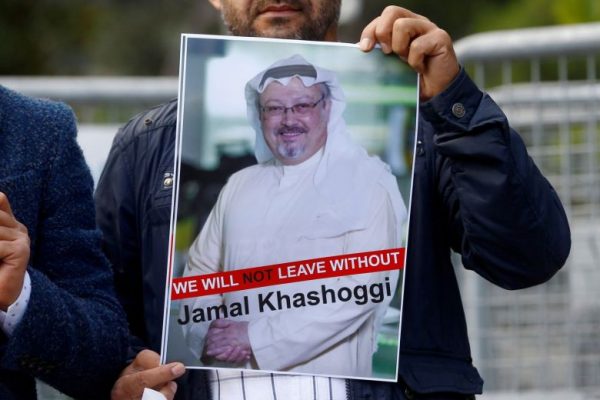
The most charitable interpretation is that this was an abduction that went horribly wrong.
The case of the vanished and apparently murdered Saudi activist and writer Jamal Khashoggi is a tale with a victim and villains, but no heroes.
Mr. Khashoggi, a longtime retainer of the Saudi royal family and more recently a critic of the regime, entered the Saudi Consulate in Istanbul, Turkey, Oct. 2, seeking documents relevant to a divorce. The Turkish government claims to have proof that a Saudi hit squad murdered him inside the consulate, chopped his body to bits, and dispatched the remains in a black van to a private plane headed for Saudi Arabia. Portions of this plot remain unverified but there seems little doubt Mr. Khashoggi is dead.
The primary villain apparently is Crown Prince Mohammed bin Salman, who runs every aspect of Saudi Arabia and without whose authorization nothing of consequence takes place. But this sordid episode isn’t best thought of as the clash between an autocratic ruler and a democratic hero. It is more of an internecine conflict.
Mr. Khashoggi, notwithstanding his credentials as a columnist for the Washington Post, spent most of his adult life working with and for the Al Saud family and its media properties. He also did stints for Saudi intelligence, headed for part of the time by Prince Turki al-Faisal, who later served as ambassador to the U.S. Mr. Khashoggi’s early claim to fame was interviewing Osama bin Laden in 1980s in Afghanistan, where both were allied with the anti-Soviet mujahedeen. Mr. Khashoggi broke with bin Laden in the 1990s and after 9/11 became Riyadh’s favorite example of a reformed Islamic fundamentalist, often produced for visiting Westerners to outline his conversion. But under King Salman and the crown prince, Mr. Khashoggi became an outcast, accused of supporting the fundamentalist Muslim Brotherhood. He moved to the U.S. in July 2017.
While Crown Prince Mohammed has made significant social and economic reforms, he has never claimed to be a democrat. Recently he acknowledged jailing 1,500 people, famously including the 300 relatives, ministers and business barons who were confined inside the Riyadh Ritz-Carlton. None of that, however, prepared those of us who knew him for the murder of a citizen in what is supposed to be the security of his nation’s consulate.
Kidnapping critics and returning them to Saudi Arabia isn’t new for this regime, though previously such incidents got little publicity because no one died. Perhaps the crown prince thought he could again escape any consequences. After all, Russia’s Vladimir Putin has poisoned dissidents in London; China’s Xi Jinping runs an archipelago of re-education camps; and Turkey’s increasingly despotic Recep Tayyip Erdogan—who is leveling the charges at the Saudis—has jailed thousands with little or no international consequence. Perhaps the world will soon forget a political murder.
But there surely will be a lasting reputational price for the crown prince. With so much power over a largely pacific populace, why would he order or sanction what amounts to a mafia murder? Mr. Khashoggi wasn’t leading a civil rebellion against the regime. Nor was he a widely popular focus of dissent in the kingdom. He seemed to pose no serious threat to Crown Prince Mohammad’s rule.
That Mohammed bin Salman believes Mr. Khashoggi was a supporter of the Muslim Brotherhood, a transnational Islamist organization, and on the payroll of Qatar, a Saudi nemesis, seems more an excuse than a reason. Those who watch the crown prince closely say he is determined to pre-empt any hint of possible disruption before it can materialize. So Mr. Khashoggi’s decision to register in the U.S. a new political organization, Democracy for the Arab World Now, perhaps funded by Saudi regional rivals, might have triggered this action.
It seems clear that Mohammed bin Salman, accustomed to issuing orders on every aspect of Saudi life without question or contradiction, wanted to silence Mr. Khashoggi. When efforts to woo him back as an adviser failed, he was captured in Istanbul, where he hoped to marry his Turkish fiancée. The most charitable interpretation is that this was an abduction that went horribly wrong.
Now what? While the crown prince can ignore Saudi domestic opinion, he must care about his international image, especially among foreign investors, whose money he needs to realize his Vision 2030 economic reforms. Businessmen who had embraced him—such as Richard Branson, Uber’s Dara Khosrowshahi and Viacom ’s Bob Bakish—are stepping back. Many others won’t dare show up at this month’s investor conference the crown prince is hosting in Riyadh. The mass incarcerations at the Ritz-Carlton a year ago had dimmed the crown prince’s image. This blackens it.
While the crown prince doesn’t care about media or even congressional criticism, he must care about any U.S. action that significantly alters the fundamental U.S.-Saudi relationship—which has never been based on shared moral values but rather on mutual security. In a dangerous neighborhood, Saudi Arabia depends on American security guarantees; likewise, any radical evolution in Saudi Arabia would threaten all U.S. interests in the region. Most important, President Trump and Crown Prince Mohammed share a deep distrust of Iran, so that the U.S.-Saudi security relationship seems likely to hold for now.
But Congress may block weapons sales in support of the crown prince’s still-unsuccessful war in Yemen, where more than 6,000 civilians have died. Sen. Lindsey Graham has warned of a “bipartisan tsunami” in Congress if the Saudis are proved guilty of Mr. Khashoggi’s murder. Congress might even go beyond Yemen and block all weapons sales to Saudi Arabia, despite Mr. Trump’s opposition.
The more lasting effect likely will be a diminution of trust, leaving the U.S.-Saudi relationship resembling a loveless marriage in which neither side can afford to file for divorce.
Ms. House, a former publisher of The Wall Street Journal, is author of “On Saudi Arabia: Its People, Past, Religion, Fault Lines—and Future” (Knopf, 2012).
The Wall Street Journal

Leave a Reply
You must be logged in to post a comment.